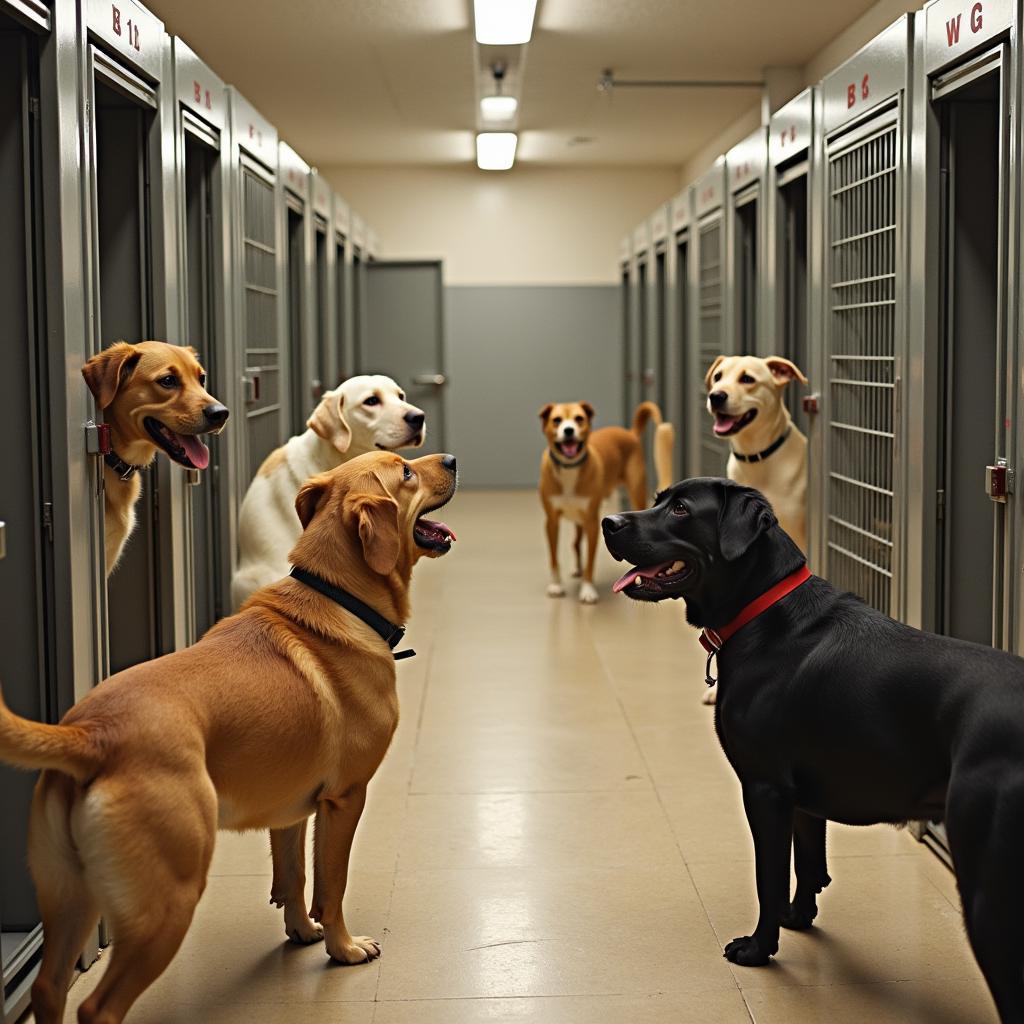When it comes to caring for animals in need, many organizations dedicate themselves to this noble cause. Two terms often used interchangeably, yet subtly different, are “animal shelter” and “humane society.” Understanding the Difference Between Animal Shelter And Humane Society is important for both animal lovers and potential adopters. While both share the common goal of protecting and finding homes for animals, their approaches and functionalities may vary.
This article delves into the nuances of each, shedding light on their unique characteristics and the vital roles they play in ensuring the well-being of animals across communities.
Defining the Terms: Animal Shelter vs. Humane Society
What is an Animal Shelter?
An animal shelter is generally a facility focused on providing temporary housing and care for stray, lost, or surrendered animals. They primarily serve the role of a safe haven, ensuring animals’ basic needs, such as food, shelter, and medical attention, are met until a permanent solution is found.
 Dogs in an animal shelter
Dogs in an animal shelter
Animal shelters operate on various models, with some being government-funded and others relying heavily on donations and community support. They often operate with limited resources, relying on dedicated staff and volunteers to manage daily operations and provide care for the animals.
What is a Humane Society?
A humane society, on the other hand, typically encompasses a broader scope of services beyond just sheltering animals. While they may also operate shelters, their mission extends to promoting animal welfare through various initiatives, such as:
- Investigating animal cruelty cases: Humane societies often have trained investigators who look into reports of animal abuse and neglect, working to hold individuals accountable for mistreatment.
- Offering low-cost veterinary services: Recognizing that access to affordable veterinary care is essential, many humane societies provide low-cost spay/neuter programs, vaccinations, and other essential medical services.
- Conducting community outreach and education: Humane societies actively engage with the community, promoting responsible pet ownership, educating the public on animal welfare issues, and advocating for animal-friendly policies.
Essentially, humane societies aim to prevent animal cruelty and promote compassion towards animals within their communities, taking a more proactive and multifaceted approach to animal welfare.
Key Distinctions and Overlapping Roles
While the definitions provide a general understanding, it’s crucial to recognize that the lines between animal shelters and humane societies can sometimes blur. Here are some key distinctions:
- Scope of services: Humane societies often offer a wider range of services, including cruelty investigations and community outreach, while shelters primarily focus on providing temporary housing and care.
- Funding sources: While both rely on donations, government funding models may differ. Some shelters are directly funded by local governments, while humane societies may receive a portion of their funding from government contracts for animal control services.
- Euthanasia policies: Both shelters and humane societies may sometimes face the difficult decision of euthanasia. However, “no-kill” shelters are committed to finding homes for all healthy or treatable animals, often operating with limited space and resources.
 Veterinarian providing care at a humane society
Veterinarian providing care at a humane society
It’s essential to consider that individual organizations may have unique characteristics that defy strict categorization. For instance, some shelters might engage in limited community outreach, while some humane societies might focus heavily on shelter operations.
The Importance of Both: Working Towards a Common Goal
Despite their differences, animal shelters and humane societies play equally crucial roles in creating a more humane world for animals. Their dedication to providing care, finding homes, and advocating for animal welfare makes a tangible difference in countless animals’ lives.
If you’re considering adding a furry friend to your family, research local shelters and humane societies like the Cottonwood Humane Society to find the right match for you. Your adoption not only gives a deserving animal a second chance but also supports the organization’s continued efforts to make a positive impact.
Finding Your Local Animal Shelter or Humane Society
Discovering the resources available in your community to support animal welfare is easier than ever. A simple online search for “animal shelters near me” or “humane society [your city]” will provide a list of organizations in your area.
Remember, every contribution, whether it’s through adoption, volunteering, or donating, helps create a brighter future for animals in need. Your compassion and action can be the driving force behind a more humane and compassionate world for all creatures.
FAQ
1. Can I volunteer at both animal shelters and humane societies?
Yes, absolutely! Both types of organizations rely heavily on volunteers. You can inquire about volunteer opportunities at your local shelters and humane societies.
2. What should I consider when choosing between adopting from a shelter or humane society?
Consider the specific animal you are looking for and your preferences regarding services and adoption processes. Contact both types of organizations to learn about their available animals and adoption procedures.
3. How can I support animal welfare if I cannot adopt?
There are many ways to support animal welfare without adopting! Consider volunteering your time, donating money or supplies, fostering an animal temporarily, or advocating for animal-friendly policies in your community.
4. Are all animal shelters and humane societies the same?
No, each organization operates independently and may have different policies, procedures, and resources.
5. Where can I learn more about animal welfare issues and how to get involved in advocacy?
Many reputable animal welfare organizations, such as the ASPCA and the Humane Society of the United States, provide valuable resources and information on their websites.
Need Help? Contact Us!
If you have any questions or need support regarding animal welfare or finding resources in your area, don’t hesitate to reach out to us.
Phone Number: 02043854663
Email: [email protected]
Address: Khu 34, Bắc Giang, 260000, Việt Nam.
We have a dedicated customer support team available 24/7 to assist you.